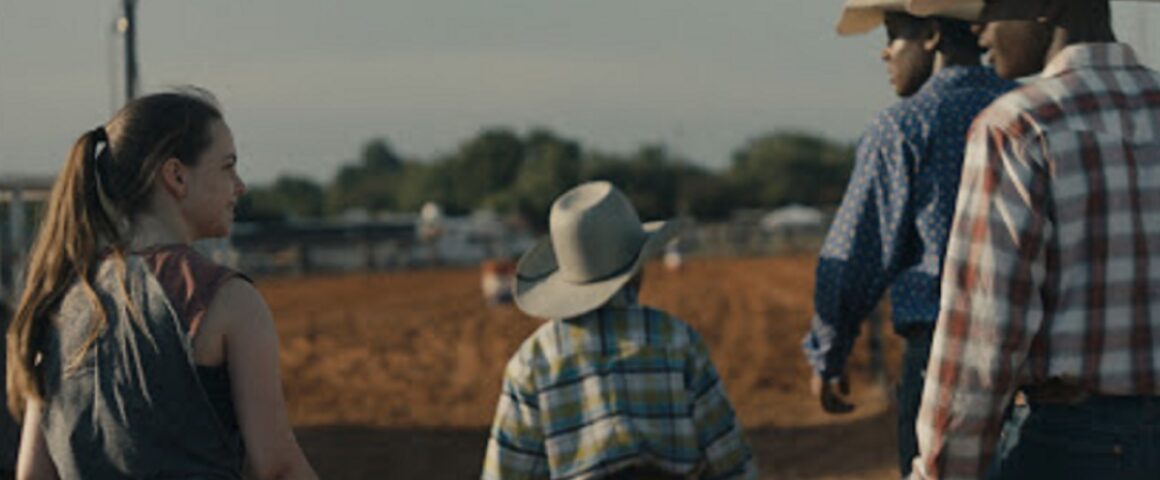Many often think about art that embodies “The American Dream.” There’s certainly quite a few films that speak to the fantasy ideals of the red, white, and blue, though there are only a few that show the raw realities within the heart of the country. Because America wasn’t built by glamorous individuals that evoke the magic of patriotism, but rather by the kind of people featured in Annie Silverstein’s Bull.
The film (which debuted at the 2019 Cannes Film Festival) tells the story of two lost spirits that meet at the most interesting of crossroads. First, there’s Kris (newcomer Amber Havard), a 14-year-old girl dealing with a lengthy list of struggles. Her mother’s serving time, she’s living with her cold grandmother and younger sister, and going through the frustrations of being a teenager. But when she eventually takes out her aggression on her neighbor’s home, that’s when things begin to take a new turn.
Her neighbor is Abe (Rob Morgan, “The Last Black Man in San Francisco”), an ex-bull rider with scars (inside and out) that prove his past. He’s now experiencing the exhausting rodeo circuit life, leaving him even more beat up than before. And when Kris rampages his apartment with her angst-filled shenanigans, Abe has had enough of the cards life has handed him.
To make up for her poor choices, Abe forces Kris to help him with various chores and errands. But along the way this inspires our young heroine to adopt a new passion that aligns with Abe’s past — creating a common bond and understanding between this unlikely friendly duo. But can Kris’s new passion help her towards a more successful life or will it send her down a path just as bitter as Abe’s own? That’s the question Bull dares to ask.
Playing on the similar vibes of indie darlings “Lean on Peter” and “The Rider,” Bull attempts to mix their successful aesthetics with a low-key “Karate Kid” take on the Texas rodeo scene. But such tales demand much more energy than what is shown here, making the pacing of the first act drag more than an actual bull does a human rider.
Yet when Johnny McAllister and Silverstein’s script eventually gets Kris to take her first 3-second ride, the energy radiating from Havard and Morgan’s performances carries the film into a much more charming direction. These two have an authentic acting magic that is rarely found between a child and an adult actor, evoking a similar bit of excellence to that of Hailee Steinfeld and Jeff Bridges in “True Grit” almost ten years ago.
Sadly, the beginnings of Kris’ promising bull riding interest don’t last. For much like the characters within Catherine Hardwicke’s uncomfortable masterpiece “Thirteen,” Bull thrives off of problematic individuals that are addicted to making the wrong choice. You constantly want them to return to the promising future’s they had ahead, but Silverstein clearly wants us to reflect on the reactions of their frequent mistakes rather than their small victories.
This is where Bull runs into its biggest hurdle — it never knows when to loosen the punishment on its characters. Kris and Abe are inherently likable protagonists that are just rough around the edges. They’re both looking for that emotional connection that life has never properly delivered on. Yet the entire world (including all of the crosses that decor Abe within his household and on his attire) seem to judge these two for wishing for such a bond regardless of their hardship. The result of such a narrative path makes for one heck of a painful cinematic experience that is an emotional struggle to get through.
Overall, Bull isn’t the kind of feel good story that it takes its narrative cues from. But it certainly delivers a final product that is built from the painful, yet authentic, realities of America. And rather than giving audiences a comforting cinematic blanket to hold onto, it forces us to examine our mistakes directly in the eye, even when the odds are against us. And that’s a lesson we need to learn more now than ever.



